#hannibal e: apéritif
Text
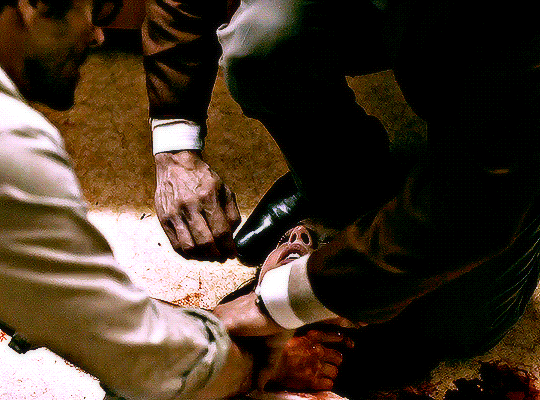
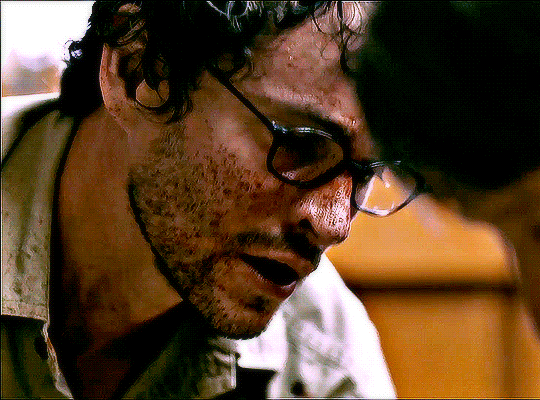
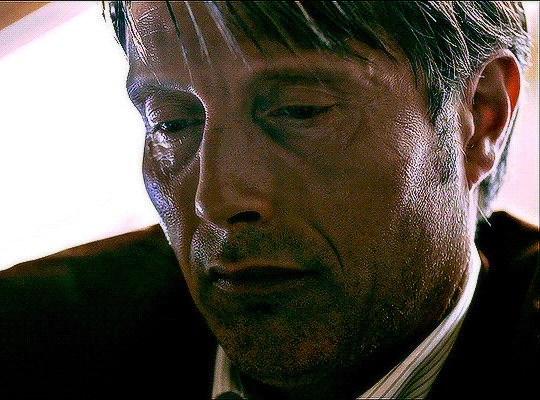
“While hunched over the gasping Abigail Hobbs, Lecter looks at Graham like a man who has perhaps found his soulmate.”
— “The Minnesota Shrike”, The Art and Making of Hannibal
#m*#hannigram#murder husbands#hannibal#hannibaledit#horror#horroredit#horrortvsource#crimeshowsource#tvedit#televisiongifs#dailyflicks#cinemapix#cinematv#uservici#userrlaura#tuserhan#userelio#usermelanie#userdiana#hannibal lecter#hannibal e: apéritif#hannibal s1#tw blood
787 notes
·
View notes
Text

Questo è un lavoro che volevo fare da lungo, lunghissimo tempo.
Comincia oggi e non so quando finirà, ma la mia passione per Hannibal a quanto pare non accenna a scemare, quindi posso ritagliarmi tutto il tempo che mi serve per dire tutto ciò che c’è da dire.
Spero.
Come mio solito parlo in chiave serissima, seria, comica e demenziale a seconda di come gira.
Per me Hannibal è tutto, è ogni forma di creatività possibile e ogni forma di comunicazione possibile.
Amo Hannibal e Will con ogni fibra del mio essere e non li ringrazierò mai abbastanza.
E poi dicono che sono SOLO personaggi…
Hannibal - Approfondimento di ogni puntata
Stagione 1 – Episodio 1 - Apéritif
#hannibal#hannigram#will graham#hannibal lecter#approfondimenti#hannibal nbc#Hannibal tv show#nbc hannibal
12 notes
·
View notes
Text
NEW The Lessons of Bryan Fuller's Hannibal S1:E4 -- FAMILY DON'T END WITH BREAKFAST
Lessons of Bryan Fuller’s Hannibal
S1:E4 – FAMILY DON’T END WITH BREAKFAST
And so dear friends and #FannibalFamily, we have arrived at S1:E4 of Bryan Fuller’s Hannibal, the episode titled “Oeuf.” And I just have to say it, and I’m sorry if this offends anyone, but I have always thought that oeuf is a weird-looking word. There. I said it.
It’s not necessarily the combo of the three vowels all in a row. We have lots of those in English. I think it’s the ‘o’ followed by the ‘e.’ Whenever I see an “oe” combo at the beginning of a word, my mind immediately goes to the Greek tragic hero, King Oedipus, father slayer, mother lover, and poor, eyeless guy that he was. And then I think of Freud’s “Oedipus complex,” his now mostly debunked theory that all children, namely male ones, go through a stage in childhood in which they sexually desire their mother and develop an antagonistic attitude toward their father. Freud theorized that if parents were loving and not abusive, children would eventually exit this phase. Karl Jung coined the term “Electra complex” in which the theory applied to female children experiencing the same feelings about their fathers.
It is funny of course that my brain has led me here because the events of “Oeuf” do indeed have to do with family – with mothers and fathers. Boys that have one mother too many, grown men that had mostly none, and a confused teenage girl who now has lost a mother and must contend with the memory of one dead father and the expectations of two live ones.
They do so much to us – mothers and fathers. Good and bad. The sheer pressure of the idea often makes me glad I never had children. I can be content that the only person I have the power to mess up is myself. Hallelujah.
An oeuf is an egg. The first three episodes of Hannibal were: “Apéritif,” “Amuse-Bouche,” and “Potage.” So, at this point, we have had an appetizer and a cocktail and a bit of hearty soup. And now out of nowhere – EGGS! In doing research, webpages about French cuisine informed me that the oeuf course is not typically included in a dinner menu. EXCEPT for this episode of Fuller’s show, in which Hannibal prepares breakfast for dinner, which is, in my opinion, one of the greatest traditions ever created. I eat breakfast for dinner quite often. It gives one a little bit of comfort at the end of the day, especially if the day was sad or rough or long. Yeah, your boss yelled at you and you slipped and fell in the parking lot and scraped your knees and there’s nothing good on TV tonight, but DAMMIT, you can have pancakes.
Hell... Now I want pancakes…
Anyway, it was sage Ron Swanson who said, “There has never been a sadness that can’t be cured by breakfast food” (Freedman). And even in an episode of a show about a cannibal psychiatrist and his obsession with a twitchy, beautiful FBI agent, breakfast comes through in the clutch yet again. More about that later…
The title of this episode is also very apropos because eggs are symbolic in and of themselves. In each episode of Hannibal, a symbol emerges. In S1:E1, it was the MONGOOSE. In S1: E2, the MUSHROOM. In S1:E3, BOATS. Eggs are symbolic of fertility, abundance, birth, and rebirth. In this episode, we see the birthing of an important thing – a FAMILY. Fertilization occurred in the Hobbs’ kitchen in “Apéritif.” The insemination was messy and violent, but the result was the same. By Episode Four, it is time for nest-building. And we know exactly which bastard would be best at that, beautiful bird that he is.
“Oeuf” was written solo by Jennifer Schuur (Big Love, The Catch). Undoubtedly, she is the namesake of poor Marissa Schuur, who wound up impaled on a rack of stag’s antlers in “Potage.” Personally, I think having a character named after you in an episode of one of Fuller’s shows an amazing and beautiful tribute. If it happened to me, I would probably stop people on the street to tell them about it. The episode was directed by Peter Medak (who has directed so many things I can’t even list them, but I just want to say that he directed Zorro: The Gay Blade which means that he is a true gift to the world forever.)
Schuur wrote an absolutely masterful episode here. The overarching theme of FAMILY is cultivated through all five acts of the script. She shows us three separate families all developing and growing at the same time. They are:
Eva’s family of Lost Boys
The BAU family with Jack as the domineering father
The Murder Family – Abigail and her two beautiful, confusing dads
In every act of this story there is a part of our lesson – a bud, a leaf, a root – that ultimately bursts into full flower at the end of the episode. Sorry, I cannot extend the egg motif to this. Birds build nests in trees – Eva, Jack, and Hannibal all build different kinds of nests. One of them is sundered by the end.
The theme of family is introduced right away with Will sitting at the Turner family table, amidst the remains of a rotting family meal and the rotting remains of the family itself. Again, we see the pendulum swing – we see the decriminalization of the scene as Will views it in his mind. I believe this is one of the best set pieces of Fuller’s adaptation of Harris’ work. The pendulum swing, which signals to the viewer that the murder scene we are observing is about to be literally rewound and undone, is very effective. The image of the pendulum is taken directly from Harris’ Red Dragon. In the beginning of the novel, when Will is alone at the Leeds’ crime scene, Harris says, “In his mind, a silver pendulum swung in darkness. He waited until the pendulum was still” (11). In Fuller’s version, once the pendulum is still, the scene has been deconstructed and Will enters as the killer, metaphorically walking in the suspect’s steps and murdering with the suspect’s hands. It is one of my favorite parts of the series. Will ends every decriminalization with the phrase, “This is my design,” and I must say, it always gives me goosebumps.
The Turner family has been killed by someone they knew, someone known and also short. The image of blood splattered all over the family portraits on the wall speaks to the theme of the episode and to the larger, real world concept of family. So much blood shed in families, by families, and for families in this world. Even if no one else has ever seen you bleed, your family has. It really can’t get more intimate than that.
A bit of a thirsty sidenote here: during the murder recreation, Will points at the Turner daughter and commands her to “eat her growing foods” or forfeit dessert (Schuur 2). This is unbearably hot and a perfect example of Daddy Will in action. There is a continuing light-hearted disagreement amongst Fannibals whether Will is “Daddy” or “Baby,” to which I answer “YES.” To Will Graham stans like me, he is all things. He’s every woman; it’s all in him.
After Will has recreated the murders, Jack enters the scene and the following bit of dialogue occurs:
JACK CRAWFORD: What do you see, Will?
WILL GRAHAM: Family values.
JACK CRAWFORD: Whose family values?
The viewer can detect the note of cynicism here in both Will and Jack’s assessment of the scene. I often imagine that if Will had answered Jack’s question, he would have said something like “America’s.” In Fuller’s show, the true killing floor of the American family is laid bare just as David Lynch does in Twin Peaks. The horror isn’t at the movies, folks. It lives next door – it works at your local car dealership – it sits next to you in the pew at church.
In the next scene, we cut to Will’s comfy Wolf Trap home, where Hannibal Lecter ascends the porch, enters through the front door, and begins feeding links of suspicious sausage to Will’s dogs. The script doesn’t indicate that the sausage is made of human flesh, but considering that later in this episode Hannibal feeds Jack boudin made from “rabbit,” (a very clumsy one in a plaid jacket we see being chased through the woods), I think it’s safe to guess that Hannibal made a lot of “rabbit” sausage.
Hannibal then begins exploring Will’s home. This scene always feels to me like an animal marking its territory. I am a cat owner and I can tell you that my cats have rubbed themselves all over everything I own. One of my cats even waits on the bathroom rug, so as soon as I get out of the shower, she can be the first to rub against me and deposit her scent. What can I say? The felines love me. Hannibal pokes through Will’s books, and literally roots through his underwear drawer. When Hannibal encounters the stacks of size small white t-shirts folded neatly in this drawer, I wish he had pulled one out and gave it a good sniff. Considering Hannibal’s legendary sense of smell, this would have made tons of sense. If he had, it would have been akin to the scene in Harris’ Hannibal when Dr. Lecter literally tastes Clarice. He breaks into Clarice’s Mustang, sits there breathing in her scent and then, “he leaned forward, found the leather steering wheel by scent, and put around it his curled tongue, cupping with his tongue the finger indentations on the underside of the wheel…Then he leaned back in the seat, his tongue back where it lived, and his closed mouth moved as though he savored wine” (Harris Hannibal 285). “Did you just smell me?” indeed.
Hannibal finishes his tour of Will’s home by admiring Will’s fly-fishing lures at his worktable set up for the process. The script indicates here that Hannibal sits down at this table and ties off a salmon tie Will has been working on, with his surgeon’s precision. Then, for a seemingly whimsical purpose (Get ready, y’all – this cannibal loves WHIMSY), he pushes the barb of the lure into his thumb, draws blood, and then puts the now injured finger into his mouth. The sound of Hannibal sucking the blood off is described as a “sound not unlike a quick kiss” (Schuur 4). If this scene isn’t showcasing the start of a tempestuous romance, then I don’t know what the fuck it’s doing otherwise. Yes, this is Hannibal-style reconnaissance, but it’s possessive and lingering and it’s about love, GODDAMMIT.
Next, in the beginning of Act One, we see Abigail and Alana at Abigail’s hospital. They are walking the grounds, discussing Abigail’s therapy. Abigail explains that she feels lost, that she is without a home. As opposed to helping her, she feels like the support groups she is in are wringing her out. Abigail concludes that most of the other patients in these groups are merely being performative and false and that this style of therapy is of no help to her. Alana listens and commiserates, but she encourages Abigail to continue trying to open up in group. Abigail’s dissatisfaction with her therapy will come up later on in the episode. Alana, bless her heart, tries her best to connect with Abigail, to serve as a confidante and a reliable adult in the young girl’s life. But considering the horrific secrets Abigail continues to harbor, the only person who can really help Abigail is Hannibal; incidentally, that is exactly the way Hannibal wants it.
We then see Alana arriving at Dr. Lecter’s office. Over her beer and Hannibal’s wine, they discuss Abigail’s progress at the hospital. Hannibal believes that the only way Abigail will make progress is if she is removed from the hospital and re-integrated into the real world. Alana vehemently disagrees. She cautions Hannibal about trying to become Abigail’s surrogate family because to Abigail it “would only be a crutch” (Schuur 9). Hannibal relents and agrees to Alana’s therapy plan, but we see later on that this promise Hannibal makes is an empty one.
Now, back at the Turner crime scene, the entire BAU family is in attendance – Jack, Will, Jimmy Price, Brian Zeller, and Beverly Katz. Team Sassy Science (as Fannibals refer to Price, Zeller, and Katz) are processing and preserving evidence. Jack explains to all of them that the Turner family had another son, Jesse, who went missing the year before; authorities could not determine whether Jesse was a runaway or was kidnapped.
We see a theme of appearance versus reality unfolding in this scene. The images families portray to the world and the actual horrors underneath. Will echoes this sentiment while examining the Turner family photos. He says, “False faces in family portraits. Layers and layers of lies betrayed by a sad glint in a child’s eyes” (Schuur 10). A big sad onion, the Turner family.
In the next scene, Schuur very pointedly pulls the theme of family forward again. The team has returned to the BAU lab at Quantico. As they work, they discuss their own families. Price, Zeller, and Katz all had siblings. Will was an only child. The description of the staging for this scene in the script says, “Jack faces Zeller, Price, Katz, and Graham. He’s like a demanding father, presiding over his children as they present what they’ve just learned at school. Will stands slightly apart, not quite fitting into this surrogate family” (Schuur 12).
Just as Will didn’t fit into his own family, now he does not fit into his work family. In this way, Will’s plight mirrors that of Chris O’Halloran, one of the Lost Boys we meet later, who is also having trouble integrating into his new family. Mind you, Chris’ new family is a lot more murdery than Will’s, but I believe this is an important parallel. As an empath, Will does not only relate to and inhabit the feelings of the killers; he feels into the lives of the victims as well. The Lost Boys are both – killers and victims.
Although she is a controversial figure, there are some tidbits of wisdom to be found in the work of the late self-help guru, Louise Hay. In her book You Can Heal Your Life, Hay writes, “We are all victims of victims” (99). She uses this phrasing to describe what happens in families. Parents victimize their children in the same way that they were victimized by their own parents. If these children do not make diligent attempts to avoid recreating these patterns, they will victimize their own children in the same ways. In this manner, generational trauma is created. All of the Lost Boys in this episode are victims of their surrogate mother, Eva, and her desire for love and belonging. But these boys were victimized by their own families before Eva ever showed up – that’s how Eva could get to them. Their inherited pain opened the door.
Also, Will not fitting in with his BAU family is juxtaposed with the family that Hannibal is preparing for Will. Throughout the episode, Hannibal is laying the groundwork to fuse his family members together. The Doctor’s plans do not turn out exactly as he wants them to, but he makes impressive progress.
At the end of the scene at the BAU, Will concludes that Jesse was involved in his own mother’s death based on the positioning of her body at the dining room table. A posture of forgiveness and acceptance is what tips Will off.
In Act Two, there is more intense discussion of family, this time between Hannibal and Will. Will sits in the familiar leather chair in Hannibal’s very well-appointed office and Hannibal begins their session with the classic, and cliched psychiatrist’s open: “Tell me about your mother” (Schuur 15). Even though Will castigates Hannibal for the “lazy” questioning, we still find out a great deal about both Will and Hannibal’s family histories in this scene. Will never knew his mother and grew up poor, following his fisherman father around from port to port. Hannibal’s parents died when he was young; he was an orphan until his Uncle Robertas adopted him at sixteen. I should note at this point, being the insane fan that I am, Bryan intended for the person to play Hannibal’s uncle in later episodes to be David Bowie, which would have been absolutely perfect beyond reckoning. The only man on earth who has cheekbones to rival Bowie’s is Mads Mikkelsen, so selling them as actual blood family would not have been difficult in the least. We lost a lot of things when the Starman left us; this amazing opportunity was one of them. It will always be my headcanon, and that’s the best that can be done. (BTW - #BowieForever).
Hannibal stresses that he and Will both have a lot of things in common with Abigail; their complicated relationships with family is yet another. In this exchange between the two men, an important piece of dialogue occurs that I must quote in its entirety.
WILL GRAHAM: There’s something so foreign about family. Like an ill-fitting suit. Never connected to the concept.
HANNIBAL: You created a family for yourself.
WILL GRAHAM: I created a pack of strays. Thanks for feeding them while I was away…
HANNIBAL: I was referring to Abigail Hobbs (Schuur 16).
Once again, in looking at the scripts in more detail, I am amazed at the sheer manipulation Hannibal attempts, just right out of the gate, just four episodes into Season One. Hannibal says that it is Will who has created a family with Abigail. I assume he means by killing her father. But, in fact, it is HANNIBAL who has created the family because he is the one who saved Abigail’s life. In that moment in the Hobbs’ kitchen, after Garrett Jacob Hobbs slashes his daughter’s throat, after Will shoots him ten times, after Will rushes to Abigail’s side, who is bleeding out on the floor, just a matter of minutes from death – in that moment, if Hannibal had not intervened, Abigail would have died. Will was way too upset – he was shaking life a leaf from head to toe. He looked as if he was having a panic attack, like he would pass out – his expression is terrifying as his entire body vibrates with his ragged breaths, blood splattered all over his face and his glasses. If you need just one scene from any film or TV show he has ever acted in to understand why Hugh Dancy is such a fucking amazing actor, this scene is the one.
When Will places his hand over Abigail’s wound to stop the bleeding, he can’t apply enough pressure. He is too upset – too much blood leaks between his fingers. Behind him, Hannibal stands. Looking at his face, (more of Mads’ genius microexpressions), the viewer sees him make a conscious decision to get involved. As if his mind said aloud, “All right, I shall intervene here. I think I know how I can use this.” Use this? For what, you ask? To get Will. To get Will to spend more time with him, care for him, talk to him – perhaps, already, in feverish fantasies, he has imagined Will killing with him. Even though events often make us question whether or not Hannibal truly loves Will, he does. It’s all about Will. From “Do you have a problem with taste?” to “See? This is all I ever wanted for you, Will. For both of us,” it’s all about Will. I can’t say I blame Hannibal. If Will Graham stumbled into my life, I think it would immediately become all about him too.
In this conversation, Hannibal is continuing his laying of groundwork. It started in the Hobbs’ kitchen – then, he stayed by Abigail’s side in the hospital. So did Will. Even when she was in her coma, the two men protected her.
The return to Abigail’s family home in “Potage” is like a ceremonial goodbye to her old family. Her old family who was at least partially killed by her new family. This is the same as Eva is doing. Eva says to her Lost Boys later in the script, “you can only have one family” (Schuur 28A). Apparently, Hannibal believes this as well. It is astonishing how quickly he moved to build himself this new family once he made the decision. It once again proves just how intensely Hannibal was KO’d by Will at their first meeting. It also proves that the loneliness Hannibal has been experiencing since his sister Mischa’s death is becoming unbearable. In Harris’ canon, Hannibal tries to turn back time. In Fuller’s version, Hannibal creates a family from blood and violence.
In the next scene, we see Jack and Hannibal having a lovely dinner together in Hannibal’s royal blue dining room. Out of all the set designs in the show, I love Hannibal’s dining room the most. It reminds me of the first lines of Bowie’s “Sound and Vision” – “Blue, blue, electric blue – that’s the color of my room, where I will live – blue, blue” (“Sound and Vision – David Bowie”). Hannibal tells Jack that they are eating a boudin noir made from “rabbit,” the aforementioned plaid-jacketed one. I always find it hilarious how amused Hannibal is by feeding people meat to people without their knowledge. It’s almost penetrative. It’s so male. Hannibal will get inside you one way or the other. The two men discuss Will. Jack is concerned that the Lost Boys case is hitting Will too close to home. Hannibal suggests that Will’s life in the past is not properly anchoring him. “He needs a anchor, Jack,” Hannibal says (Schuur 19). But that anchor is not Jack. Hannibal is already Will’s paddle, he might as well be his anchor too. Hannibal is just like Will. He’s every woman. It’s all in him.
Back at the BAU, Team Sassy Science examines more evidence from the Turner crime scene – soda cans, shoes, video game controllers. From this evidence, the team determines that there were three other boys with Jesse at the crime scene. Zeller is the one who dubs them, “The Lost Boys.” This is, of course, an apt moniker because both the Peter Pan tribe and the pack of film vampire teens are examples of created or found family. They are misfit children, all of them. Price pulls Connor Frist’s fingerprints, which will lead them to their next crime scene.
Next, we see Jack storming into Will’s Quantico classroom and very unceremoniously dismissing his students. He tells Will about Connor Frist, who went missing ten months ago, and that Will must get ready to board a plane with the team to the Frist’s home in Huntsville (I assume Alabama.)
Cut to the BAU team and other officers entering the Frist family home, which is all decked out for Christmas, even though it has not been the holiday season for some time. The mother, father, and two smaller Frists are all dead. A dog trots into the scene carrying a decapitated arm. You gotta give it to Fuller and all the writers on this series. The humor is darkness at its finest.
Act Three begins back at the BAU with Team Sassy Science examining the bodies of the Frist family. They discover that one of the bodies is the Lost Boy Connor Frist himself, who was apparently shot and then his body burned in the family fireplace. Together the team theorize that Connor tried to kill his mother, but she did not die with the first shot to her head, and possibly began having a seizure, which caused Connor to panic. Because of this panic, someone taller with a larger caliber weapon dispatched both Connor’s mother and Connor himself. Down feathers found with Connor’s remains indicate that someone put a pillow under the boy’s head before he was shot. The juxtaposition of the savagery and compassion of the Frist scene befuddles Jack, but Will manages to catch the loose thread of the fabric saying of Connor’s death, “Whoever shot him… disowned him” (Schuur 26).
Next, we see Will in Hannibal’s office again. I found myself beginning to question at this point if every time we see Will in Hannibal’s office if he is attending his therapy session or if he and Hannibal are close enough now that he just goes to Hannibal’s office whenever he needs to talk. I know his appointment time with Hannibal is 7:30 p.m., but I am unaware if it is every week or every other day or every day. (If anyone reading this knows, please comment.) Will is angry when he enters Hannibal’s office – not at Hannibal, but at himself and at the Lost Boys. He tosses down a very plain, but neatly wrapped package that he says he intended to be a gift for Abigail: “Magnifying glass. Fly tying gear,” but that he “thought better of it” (Schuur 27). After buying the gift, Will realizes that Abigail’s father taught her how to hunt and that the idea of Will teaching her to fish bears too strong a resemblance to the trappings of fatherhood. Hannibal asks Will if he is “feeling paternal;” he confirms that he is and asks Hannibal if he feels the same, which Hannibal also confirms, but also passes along Alana’s warning about the dangers of assuming new familial roles for Abigail. Will then explains that he is actually angry about the boys in the case he is currently working. A great deal is made of Will’s almost perfect empathy. Several plotlines in the series really bring it to the fore and rely on it for dramatic movement. But Will’s empathy is also showcased in small moments like this one with Hannibal. Will says, “I’m angry about these boys. I’m angry cause I know when I find them, I can’t help them. I can’t give them back what they gave away” (Schuur 27). Will is angry because the boys cut themselves off from the one thing Will never really had – family. Jack Crawford is correct – the case is hitting Will too close to home. But most importantly, Will is upset that he will not be able to help the boys once he tracks them down – to Will, actually finding them is secondary. Being able to fix something once he does is paramount. It is a horribly naïve view for someone who spends as much time with murder as Will does, but it is the essence of who Will is. Will cares. But he also cares too much. People who care too much run the sincere risk of burning themselves out – and when they do, God help those around them. Their new life philosophy doesn’t always shift into “don’t give a fuck,” it shifts into “I’m gonna make people pay.” Not always, but as a person who cares too much, sometimes I really crave a villainous turn for myself… I’ll never do it. I’m too soft-hearted.
In this context of Will’s anger at the boys who sacrificed their own loving families, Hannibal enters with the verbal equivalent of quick-dry cement and a rake. AKA, groundwork manipulation. He remarks to Will, “Abigail is lost, too. Perhaps it is our responsibility, yours and mine, to help her find her way” (Schuur 28). See? You and me, Will. You and me. You can’t fix what’s wrong with these boys, but together we can fix Abigail. Won’t it feel nice to create something rather than destroy it? Won’t it feel nice to belong somewhere, to belong to someone? Hannibal is a genius. Completely unethical, but when Hannibal wants something or someone, he doesn’t let anything get in his way, even if he has to eat them.
Now, we see for the first time in the episode our Lost Boys family – but we see them with their surrogate mother, Eva, played insanely well by Molly Shannon, who absolutely kills in dramatic roles. Personally, I love comedic actors in dramatic roles; I feel they are able to shift back and forth seamlessly because in all forms of comedy is the element of darkness – the dissatisfaction or anger or fear or sadness that drove the creator to write it. But, I digress…
Eva is sitting in a diner with her three “boys,” C.J. Lincoln, Jesse Turner, and Chris O’Halloran. Over burgers and fries, the “family” is discussing what happened to Connor. Eva makes Connor’s murder sound like a mercy killing, that he was granted the love he could not kindle for his new family. Chris asks about Eva’s “real” family – she vaguely mentions a brother and it seems he was not particularly kind to Eva. Eva (and her name is Eva, I imagine, to be like that of Eve, the first mother ever in Christian mythology) – Eva says, “The family you’re born into isn’t really family. Those are just people you didn’t choose. You have to make family” (Schuur 28).
In expressing this, Eva is expressing the feelings of very real people, many of whom are in Hannibal’s audience, who have been disowned by their families. Or, people who have had to walk away from their own families in order to preserve their own safety and sanity. Families are rent apart for all reasons under the sun, but the ones I hear of most often are because of neglect, abuse, and marginalization. Children are disowned by their parents for all sorts of reasons – the child is queer or the child doesn’t want to be a doctor or the child isn’t religious or the child has an addiction or the child suffers from mental illness or for whatever shitty reason the disowning parent needs to make themselves feel justified. But also, children cut their parents off all the time too – for similar or equally shitty reasons. These people then go on to create new families wherever they can find them – at work, in the military, at school, online, at the gym, or in their own minds.
If a family member is hurting you and won’t stop and you are able to get away, you owe it to yourself to do so. I would never, ever say that someone should stay in a situation where they are unsafe or unhappy or in danger. Many people need their new families like air because their real families will never be mended – the gap will never be bridged and in many cases shouldn’t be. But to loop back to Louise Hay, I must offer her wisdom again, “We are all victims of victims.” Families, all of them, of every ilk, are messy. No one emerges unscathed. No one.
In the next scene, we see Will alone in his classroom at Quantico, sitting at his desk, studying photos of Jesse Turner and Connor Frist. The beautiful and badass Beverly Katz comes in. Will tells her he believes all of the Lost Boys have ADHD because they are small for their age and this could indicate they have been taking meds that have stunted their growth. Bev informs Will that Price has identified the gun that killed Mrs. Frist; it was used to kill C.J. Lincoln’s mother a year ago.
Now, we see all of Team Sassy Science, Jack, and Will looking at a picture of C.J. along with his juvenile criminal record on a screen. They bandy about theories about C.J. Will does not believe he is the ringleader. He believes the leader to be a still older boy.
Meanwhile, Eva’s family of Lost Boys are at a convenience store. As young Chris stands next to Eva at the cash register, C.J. glares at Chris from behind a shelf of soda bottles. C.J.’s eyes are as flat and cold as a sheet of ice. The boy is dead inside. Chris is terrified. He involuntarily urinates all over himself. When Eva discovers Chris’ now wet state, she cleans up the puddles using napkins from the counter and tries to console Chris, though she is completely unaware of the cause of Chris’ distress. I guess being a murdering criminal really doesn’t prepare a person for sudden motherhood of mentally disturbed children. Gosh, who woulda thunk it?
We shift now back to Abigail Hobbs’ very posh psychiatric hospital. (I find myself wondering who is paying for Abigail’s stay in the upscale sanitarium. The FBI? Based on the state of health insurance in America, I doubt her parents’ insurance is covering it. That and both her parents are dead. I wonder if Hannibal is paying for it. I wonder if legally Jack could have allowed Hannibal to bankroll Abigail’s recovery. Hannibal has the money, trust me. I will discuss my theories about the source of Hannibal’s funds in a later post, but let’s just say it’s a combo of family money and dead people money.)
Hannibal invites Abigail to leave the hospital for the evening and come to his house so he can make her a proper dinner. Abigail questions whether the hospital administration will allow her to leave after her egregious wall-climbing episode in “Potage.” Hannibal’s response to her is very significantly phrased: “You could say I’m one of your guardians” (Schuur 31). The foundation of Hannibal’s House is almost complete – the pillars have been sunk. Just need to wait for the concrete to dry.
Hannibal tells her he will have her back by bedtime. As Abigail gets ready to leave with Hannibal, she comments about how much she dislikes being in group therapy. She cannot be open in group because she cannot tell them about her murder of Nick Boyle. Hannibal says, “You must only lie about one thing. And when you’re with me, you don’t have to lie about anything” (Schuur 31A). The purpose of this comment is twofold. First, it is more of Hannibal preparing the way for his Murder Family – all families have secrets, silly ones and painful ones and all kinds of hidden information. Hannibal is now the only person in the world Abigail can tell the truth to – Hannibal has effectively isolated her from everyone, even people like Alana who are actively trying to help Abigail in good faith. This in Hannibal is classic narcissist behavior and we see him do it with almost everyone he really cares for – Abigail, Bedelia, and especially Will. The second purpose of this comment is that Hannibal is absolutely convinced that Abigail helped her father kill his victims and he wants Abigail to come clean with him, Hannibal keeps secrets like he keeps business cards, but if he has identified you as someone that belongs to him, you are not allowed a single secret of your own. He will poke around in your underwear drawer or your subconscious or both until he gets the truth. I suppose one could look at their subconscious as the underwear drawer of their mind. If so, both of mine could use a good cleaning. Anyway…
Act Four begins in Hannibal’s kitchen, the setting of many important scenes in the series. It makes me think about the tried-and-true principle that when a person throws a party, no matter how large or luxurious the rest of the house is, the bulk of the partygoers wind up in the kitchen. A good deal of the things that happen in Hannibal’s kitchen could not be termed as “parties,” but there definitely is a lot of action and drama in this room. Hannibal is making breakfast for dinner, a recipe, in fact called, High Life Eggs. Should you like to recreate this recipe, you must immediately acquire yourself a copy of Janice Poon’s Feeding Hannibal. Janice was the food stylist for the series. She is an amazing chef, stylist, and person to boot. She loves her Fannibal Family and the book is resplendent with full color photos and a foreword by Mads himself. No Fannibal library is complete without a copy. High Life Eggs is eggs and sausage. It looks delicious.
As Hannibal cooks, Abigail stands in the kitchen and the two discuss her future. She discovers that on a side counter Hannibal is steeping mushrooms in a teapot. He encourages Abigail to drink the tea, laced with the fungi’s psilocybin, to help her process the traumatic memories of her father. Abigail agrees.
Now back at the BAU, Team Sassy Science and Jack and Will are looking at a case board filled with photos of the Lost Boys and the timeline of their abductions and the subsequent family murders. The boys are traveling southbound, but since none of them are of driving age, the team is confused as to how they are moving that way. This is the moment that the idea of an adult who is traveling with the group enters Will’s mind. He determines that the boys have been capture-bonded to this adult who now serves as their new master. Based on Will’s hunch, Jack expands his search.
We return to Hannibal’s kitchen where Abigail Hobbs is now totally on a full-blown shroom trip. In her inebriated state, she drops a teacup on the kitchen floor and watches it shatter. This is the introduction to one of Hannibal’s most predominant and important motifs. The provenance of this motif in Harris’ work will be discussed in a later post, but it would be remiss of me not to mention the first occurrence of the teacup, a symbol of fraught and delicate meaning in the series. Hannibal explains that Alana would not approve of him giving psilocybin to Abigail, but that it will be one of “many secrets” the two of them will share (Schuur 36). It occurs to me at this point that Hannibal “capture-bonds” people to him just as Eva does – well, with definitely more nuance and finesse, but the philosophy is the same. Because Hannibal knows about Abigail’s murder of Nick Boyle and has helped her cover it up, he always has this secret to use against her, and should she get out of line, it is the threat of the revelation of that secret that keeps her bound to Hannibal. Much, much later, Alana calls it blackmail and she is absolutely correct. Abigail also stays connected to Hannibal because let’s face it – he’s damned charming and seems to give her exactly what she needs. If you need an attentive daddy and aren’t very picky about his criminal record, one could do a lot worse that Dr. Hannibal Lecter.
Abigail begins experiencing the nauseous phase of a hallucinogenic trip. Hannibal coaches her through it, and tells her to lean into her feelings. She muses dreamily that Hannibal is making breakfast for dinner. Then, a very crucial dialogue exchange occurs.
ABIGAIL HOBBS: Eggs and sausage was the last meal I was having with my parents.
HANNIBAL: I know. It’s also the first meal you’re having with me.
Again, Hannibal proves himself to be an astonishingly devious motherfucker. The meal selection is purposeful. The mushroom tea is purposeful. In Abigail’s state of enhanced consciousness, her senses will be teased with the nostalgia of the smells and tastes of her family kitchen – but now, instead of her father preparing that same meal, she will see Hannibal. The smells, the tastes, the memories will all blur together and Hannibal will become her new father. Although Hannibal’s weapon of choice is a good knife, throughout the series, he also wields a more subtle one – drugs. He drugs so many people in the series it is difficult to list them all. As a doctor, he is aware of all the medications, both natural and synthetic that can be used to warp the human mind. And he makes use of them all. If you don’t love him, he’ll dose you with scopolamine and flashy lights until you do. Like I said, Hannibal gets what he wants – no matter what.
The significance of the breakfast meal reaches a higher note when the viewer realizes at the end of the episode that the other person Hannibal intended to be sitting at the dining room table with he and Abigail was Will Graham. If Will hadn’t been otherwise engaged, Hannibal’s plan to cement the foundations of his family that night over sausage and eggs might have been successful.
Hannibal and Will both have, in their own ways, tried to place themselves in Abigail’s life as new family members, new fathers. The difference is in intention and execution. Will stumbles into this new fatherhood and seems to have only the best hopes for Abigail, although his own motives seem confusing to him. Hannibal executes his plan with precision and solid intent. Since “Apéritif,” he has incrementally been making both Will and Abigail more accustomed to the idea of the three of them as a family. He insinuates the idea into their subconscious minds and he also states it just flat out to their faces. Hannibal comes at you from all sides. When he wants something, Hannibal will get it by hook, by crook, or if you are unlucky, by something sharper.
Back at the BAU, Alana has come in to help Jack’s team try to identify the Peter Pan of the group of Lost Boys. She and Will and Bev all look at files and photos of kids who have gone missing and fit the basic profile Will has worked up. Through discussion and teamwork, they pull out the file of Chris O’Halloran as a possible Lost Boy. When Alana says that the boys are like, “brothers looking for a mother,” everything clicks in Will’s mind (Schuur 39).
Will goes to talk to Jack. He tells Jack that the leader of the boys is a woman who is “looking to form a family” (Schuur 39). Jack says, “Family can have a contagion effect on the alienated. You adopt the same behaviors” (Schuur 39).
This, of course, is exactly what is happening to Will and Abigail as Hannibal’s contagion works its way into their system. Will, as an empath, is already known for adopting the behaviors of those around him, even down to their ways of speaking and physical gestures. But, like Hannibal, Will is becoming more protective of Abigail. Like Hannibal, Abigail is lying more often, and is learning how to lie better. And they both are becoming more reliant on Hannibal. The virus is already in their system. I would imagine that under a super-powered microscope, the Hannibal virus wears a little three-piece suit and you can hear strains of a tiny piano playing The Goldberg Variations. It’s absolutely true and you can’t convince me otherwise.
The BAU team then comes up with video camera footage of Chris O’Halloran in a convenience store with Eva. Chris’ family lives in Fayetteville, North Carolina, and so the team gears up to descend on that home.
Act Four ends with Chris on the front doorstep of his family home, ringing the doorbell. His mother opens the door and is overwhelmed with joy to see her missing son returned to her. Until C.J. steps onto the porch holding a gun.
Act Five begins with an FBI SWAT team and all of Team Sassy Science and Jack and Will storming into the back yard of the O’Halloran home. The boys are holding Chris’ family hostage at gunpoint around a barbeque grill. SWAT shoots and kills C.J. Chris runs. As Jack and the rest of the team tend to Jesse Turner and the O’Halloran family, the patriarch of which has been wounded, Will catches up with Chris by the pool. Chris has a gun. Will begins coaxing Chris to put the gun down. The boy is conflicted, confused. Eva suddenly steps out from behind the pool house and settles in behind Chris. She drapes her arm in a motherly embrace around Chris’ neck, revealing her firearm. She commands Chris to kill Will. Will begins baiting Eva. He questions the horrible things she has done to the boys, her “family” she supposedly loves – she kidnapped them; she forces them to kill people. At this point, Eva says something that is very key to our lesson.
EVA: I’m honoring them like their other mothers wouldn’t. They’re not invisible anymore. I can see them. I see who they are and love them (Schuur 40A).
Seeing and being seen is one of the most dominant and recurring themes in Hannibal. Acceptance and understanding are as well. More about that in my conclusion.
Eva continues to push Chris to shoot Will. Chris freezes. When Eva raises her own weapon to fire at Will, from behind him, there is a shot. The camera cuts to show that the shot has come from Beverly Katz. Eva is hit in the shoulder. As she falls, Chris is released. Bev takes the kid away and Eva is arrested.
We now see Chris sitting in the back seat of Jack Crawford’s car. Jack gets in the driver’s seat and turns over his shoulder to talk to Chris. Jack is preparing Chris for the long hours of questioning and court proceedings that are in his future. Chris asks about jail and then says of Eva, “She told me they weren’t my family. That we had to make our own family” (Schuur 43A). Chris asks to speak to his real mom, but Jack tells him that can’t happen until later, probably after a good deal of interrogation. Jack takes Chris away.
Now, at Hannibal’s house, we see that Alana has arrived and is laying into Hannibal about checking Abigail out of the hospital without her permission. In a line that is absolutely hilarious to the #FannibalFamily, Alana says, “Rude, Hannibal. Shockingly rude” (Schuur 43A). It has all sorts of implications, but I find myself most often wondering if Hannibal could lop off a small bit of himself for Alana to eat or even more to the point, if he could find a small piece of his body that he could eat himself. The rude get eaten. Hannibal is definitely more than a snack. He's a five-course meal.
Hannibal apologizes. He tells Alana that she was right, that Abigail was not yet ready to leave the hospital. She suffered some distress and so Hannibal has given her “half a valium” (Schuur 44). The two go into the dining room, where Abigail sits, her eyes watery with stoned emotion. Alana sits in the place at the table that was meant for Will. Abigail smiles brightly and stares at Hannibal and Alana. The image of her two guardians shift into a beautiful image of her parents. When Hannibal asks her what she sees, Abigail says, “I see family” (Schuur 45). The episode ends.
And now dear readers, the LESSON.
To which you say, “Oh my God, about fucking time!”
I promised you a lesson. I never promised brevity.
Outside of Hannibal, in the non-fiction world, some people are lucky enough to have “real” family members who are kind and reliable people. Still, many people have to leave their “real” families behind and find and make their own. I have delineated the reasons people must walk away from family before – abuse, neglect, or any shade of agony along the spectrum of wielded pain.
Many people are crucified by their families for being the one thing those family members cannot tolerate – DIFFERENT.
When I was a little girl, I loved Mr. Rogers. I still do. I love him with all my heart. One of the reasons I loved good ol’ Fred was because every single day, he told me, “You’ve made this day a special day by just your being you. There’s no person in the whole world like you, and I like you just the way you are” (Fred Rogers, every day).
And so the lesson…
“REAL” FAMILY LOVES US FOR EXACTLY WHO WE ARE.
They love our strengths and our weaknesses. They love our admirable traits and our not so admirable ones. They love our morning breath, and our crappy dancing, and our little idiosyncrasies. They love the big things about us too. They don’t shame us for being who we are and they don’t try to change us to fit some ridiculous standard that they deem to be more “acceptable.”
They love our scars as much as our smiles.
If your own family doesn’t love you like this – get you a new one. Even if you have to make it.
Just don’t kill anybody.
Try social media. I hear tell there’s lots of folks there.
By the way, I must send MUCH, MUCH LOVE to my #FannibalFamily.
Eva was wrong. You can have more than one family. I have two.
Here endeth the lesson…
References:
Freedman, Adrianna. “54 Ron Swanson Quotes from ‘Parks and Recreation’ Guaranteed to Make You Laugh.” Men’s Health, www.menshealth.com/entertainment/a34774462/ron-swanson-quotes. Accessed 18 Jan. 2023.
Harris, Thomas. Hannibal. New York, Delacorte Press, 1999.
Harris, Thomas. Red Dragon. New York, Berkley, 2000.
Hay, Louise. You Can Heal Your Life. New York, Hay House, Inc., 2004.
Rogers, Fred. The thing he said on every single episode of Mr. Rogers’ Neighborhood.
Schuur, Jennifer. Writer. “Oeuf.” Hannibal, season 1, episode 4, Chiswick Productions, 2012.
“Sound and Vision – David Bowie.” Lyrics.com, www.lyrics.com/lyric/32096867/David+Bowie/Sound+and+Vision . Accessed 18 Jan. 2023.
33 notes
·
View notes
Photo
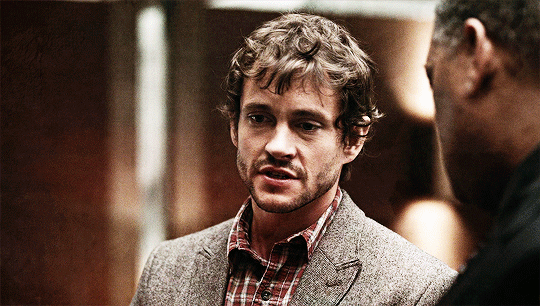

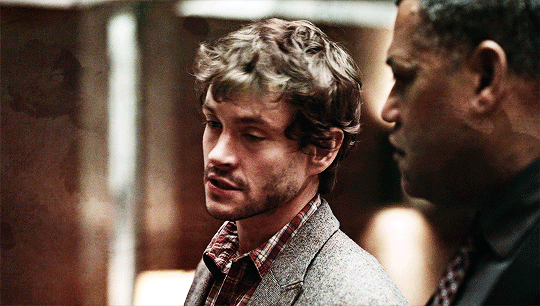
Hannibal Rewatch 2020 - Apéritif
That may require me to be sociable.
145 notes
·
View notes
Text
apéritif
Author: ttamarrindo
Ships: Jinkook, VMon and Yoonseok
Word Count: 7k (rated E)
Type: Graphic Descriptions of Violence, Hannibal AU, Teacher-Student Relationship
Summary:
psychology professor kim seokjin is used to seeing people as simple things, meant to be played with and used like he pleases. nothing more. jeon jungkook is the student who falls into his trap all too willingly.
(alt: Hannibal!AU)
Read on AO3
Admin note: you know how every person has the fic for them, well this is mine. it’s incredibly well written and the characterisation is really well done. even if you don’t ship jinkook, this is still a must read. besides, it’s a hannibal au which makes it 3762839 times better.
- admin han
#hannibal au#graphic descriptions of violence#top seokjin#bottom jungkook#teacher-student relationship#smut#admin hahahan#ttamarrindo#jinkook#vmon#sope#yoonseok#blood and gore
25 notes
·
View notes
Text
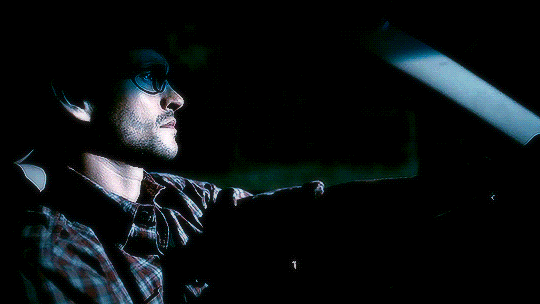

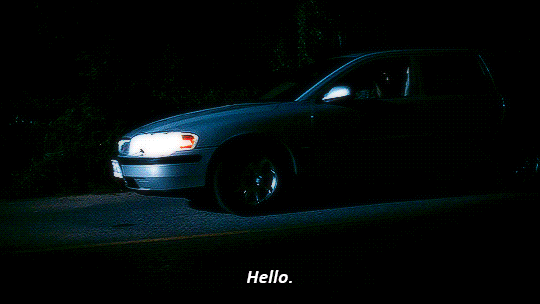


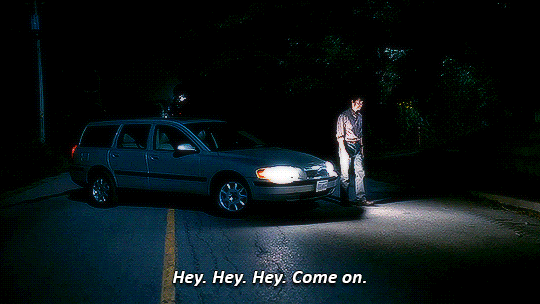


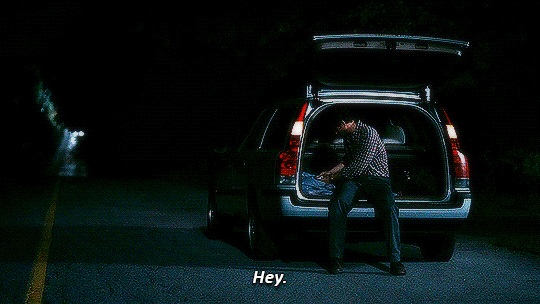


Hannibal 1.01 “Apéritif”
#m*#will graham#hugh dancy#hannibal#hannibaledit#horror#horroredit#horrortvsource#crimeshowsource#tvedit#televisiongifs#dailyflicks#cinemapix#cinematv#filmtvtoday#uservici#userrlaura#tuserhan#userelio#usermelanie#hannibal e: apéritif#hannibal s1#tw flashing
351 notes
·
View notes
Text


Hannibal 1.01 & 1.03
#m*#hannibal#hannibal comparisons#will graham#hugh dancy#hannibal lecter#mads mikkelsen#hannibaledit#hannibal 1x01#hannibal 1x03#hannibal s1#horror#horroredit#horrortvfilmsource#crimeshowsource#userbbelcher#userstream#chewieblog#dailyflicks#cinemapix#tvandmovies#useroptional#smallscreensource#rainbowgifs#FADserver#uservici#userrlaura#hannibal e: apéritif#hannibal e: potage
271 notes
·
View notes
Text


Will Graham in Hannibal S1E01 "Apéritif"
#he is so pretty I hate him#hannibal#hannibaledit#will graham#hugh dancy#nbc hannibal#hannibal nbc#hannibal 1x01#hannibal s1#userbbelcher#userstream#chewieblog#dailyflicks#tvedit#cinemapix#tvandfilm#tvandmovies#hannibal e: apéritif#*mine
420 notes
·
View notes
Text
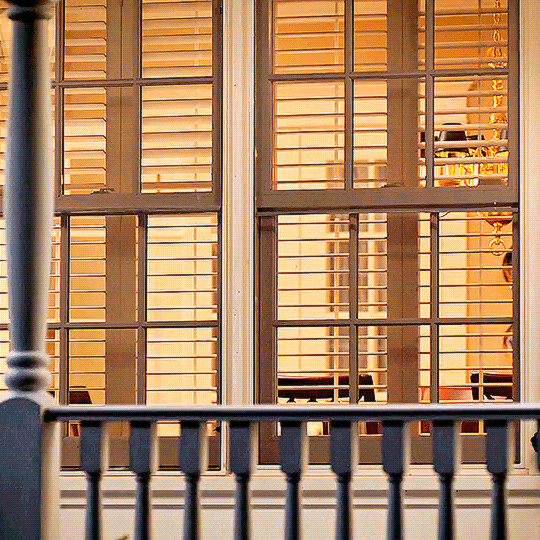
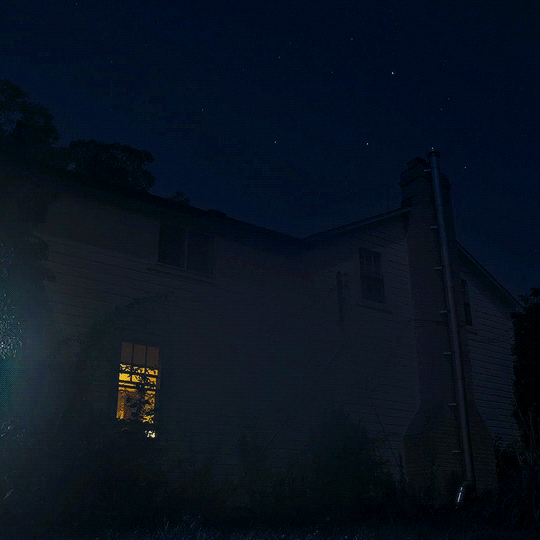

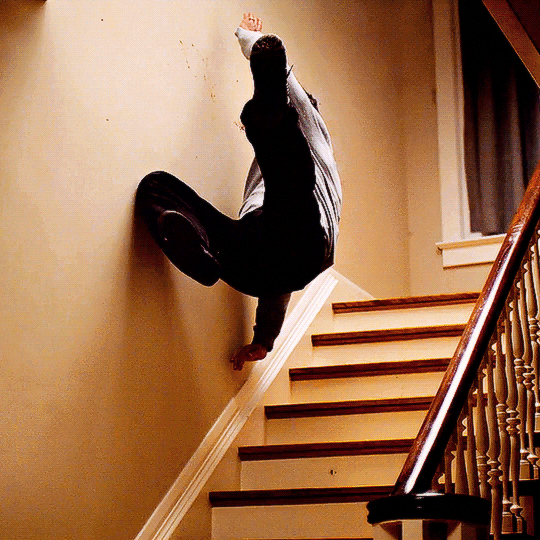
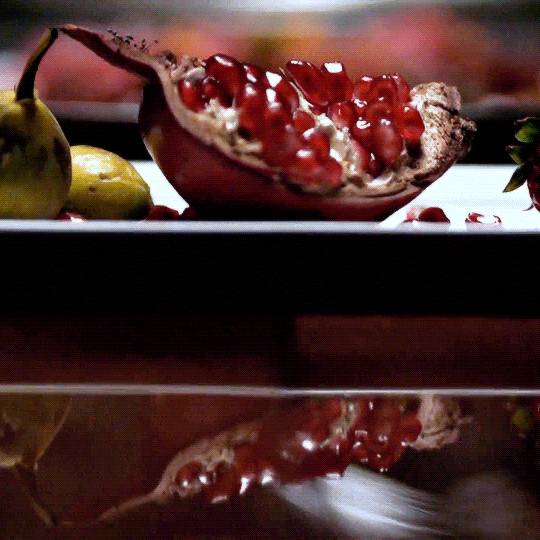

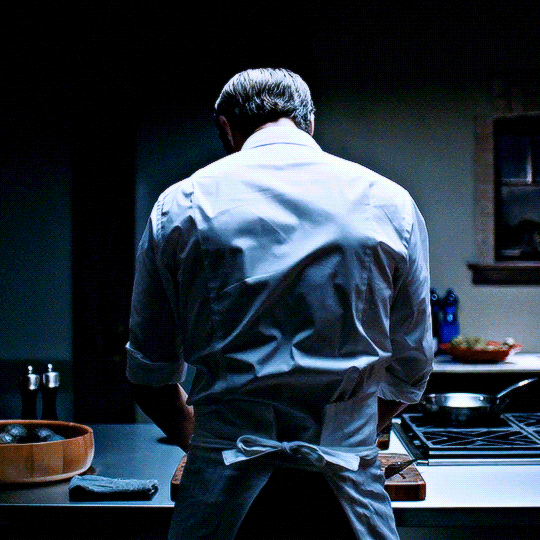



hannibal faceless S1E01 “Apéritif”
#hannibal#hannibaledit#hannibal gifs#nbc hannibal#hannibal nbc#hannibal 1x01#hannibal s1#userbbelcher#userstream#chewieblog#dailyflicks#tvedit#cinemapix#tvandfilm#tvandmovies#hannibal e: apéritif#hannibal faceless#*mine
187 notes
·
View notes
Text



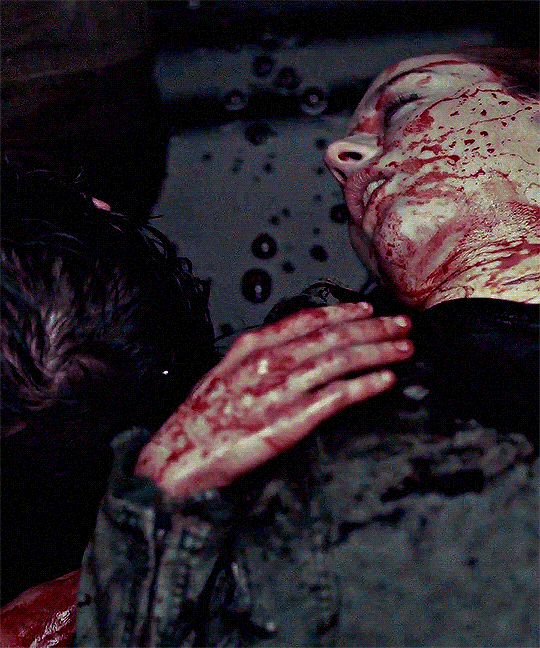
The Carnivorous Lamb, Agustín Gómez-Arcos (transl. William Rodarmor)
Will Graham and Abigail Hobbs in Hannibal S1E01 "Apéritif" / S2E04 "Takiawase" / S2E13 "Mizumono"
#I hurt myself making this btw#hannibal#hannibaledit#will graham#hugh dancy#abigail hobbs#kacey rohl#horroredit#nbc hannibal#hannibal nbc#hannibal gifs#hannibal 1x01#hannibal 2x04#hannibal 2x13#hannibal e: apéritif#hannibal s1#hannibal e: takiawase#hannibal s2#hannibal e: mizumono#hannibal s3#*mine#blood tw
193 notes
·
View notes
Text


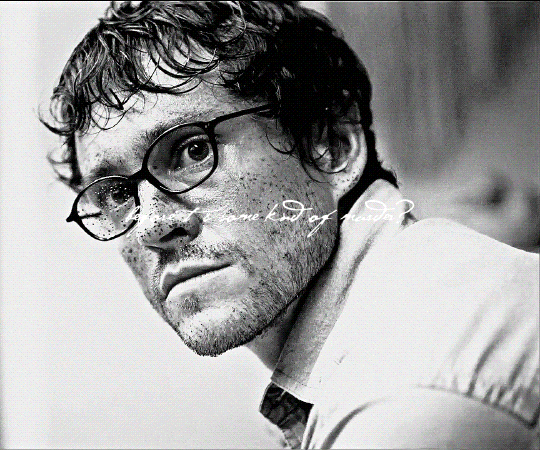
Will Graham in Hannibal S01E01 "Apéritif" and S01E13 "The Wrath of the Lamb" / "portrait of fryderyk in shifting light" by Richard Siken
#hannibal#hannibaledit#will graham#hugh dancy#horroredit#horror#nbc hannibal#hannibal nbc#richard siken#hannibal e: apéritif#hannibal s1#hannibal e: the wrath of the lamb#hannibal s3#*mine#I think s1 will would be horrified to find out who he turned into#by the end of the show#(I had to change the quote slightly - originally it is 'it's' and not#'it is' - cause the font - which is called 'Hannibal Lecter' and#apparently based on his writing in the show - did not include ')
73 notes
·
View notes
Text
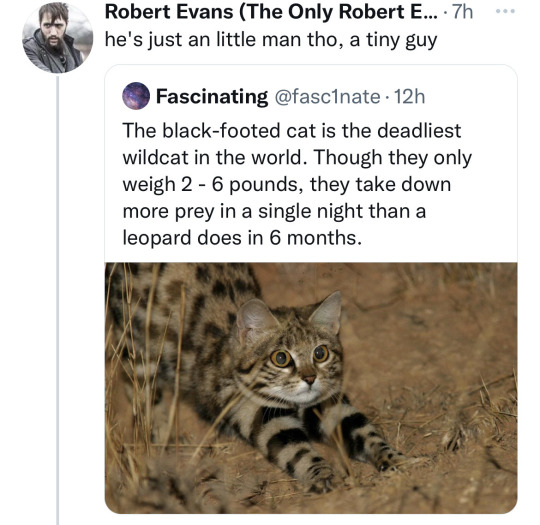
This is how Hannibal saw Will in Apéritif.
#hannibal#hannibal 1x01#will graham#hannibal lecter#hannigram#murder husbands#otp: ache & hunger#hannibal e: apéritif#hannibal s1
24 notes
·
View notes
Photo
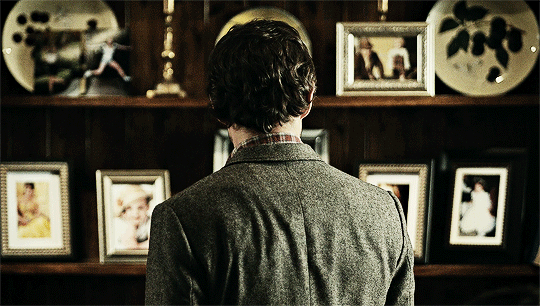
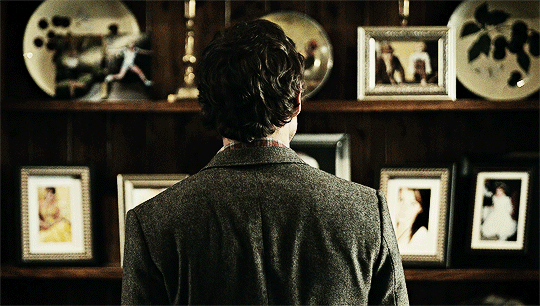
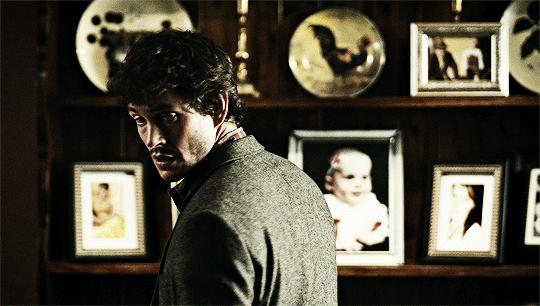
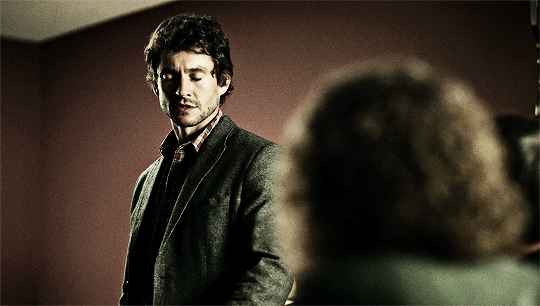
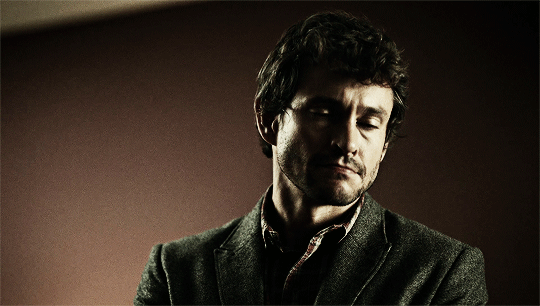
Hannibal Rewatch 2020 - Apéritif
How’s the cat?
85 notes
·
View notes